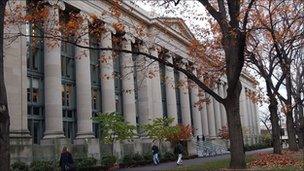Harvard endowment rises to £21bn
- Published

Harvard charges fees of £34,000 per year - but families earning less than £42,000 do not pay
Harvard University has consolidated its position as the richest university in the world - with the value of its endowment rising by 20% to £20.7bn.
It means the United States university has added £4.4bn to the value of its endowment in a single year.
As an international comparison, a report last week showed that the annual turnover for the entire UK higher education system is £26bn.
Income from the endowment is Harvard's biggest source of operating revenue.
The endowment - made up of 12,000 individual funds - provides the university with an investment income that supplements cash from research, donations, fees and public funding.
Fee subsidies
Last year's figures showed that the university's operating revenue was £2.4bn - and the endowment will be expected to pay about a third of this, the largest single stream of income.
It means that despite charging £34,000 per year in fees - the university is not over-reliant on fee income, with fees representing less than a fifth of Harvard's operating costs.
This allows the Boston-based university to operate an admissions policy based on ability - and to disregard ability to pay, with a £103m scholarship fund.
Next year students from families earning below £42,000 will not have to pay any tuition fees.
The university says that such scholarship packages allow it to keep ahead in the global competition for the most talented students.
In terms of Harvard's pattern of overall funding, the income from fees was less last year than from research sponsors - with the US federal government representing the biggest share of this.
In terms of outgoings, the university has an annual salaries and staff benefits bill of about £1.2bn.
The endowment is run by the Harvard Management Company, set up in the 1970s to manage the university's investments and financial assets.
Despite the rise in value, it has still not recovered to its level from before the financial crisis.
In comparison, the University of Oxford last year had an income of £880m. Research grants and contracts were the biggest source of income, £367m, followed by government funding body grants of £203. Staff costs were about £470m.
Changes to the funding system in the UK will see universities relying more heavily on tuition fees rather than government funding.